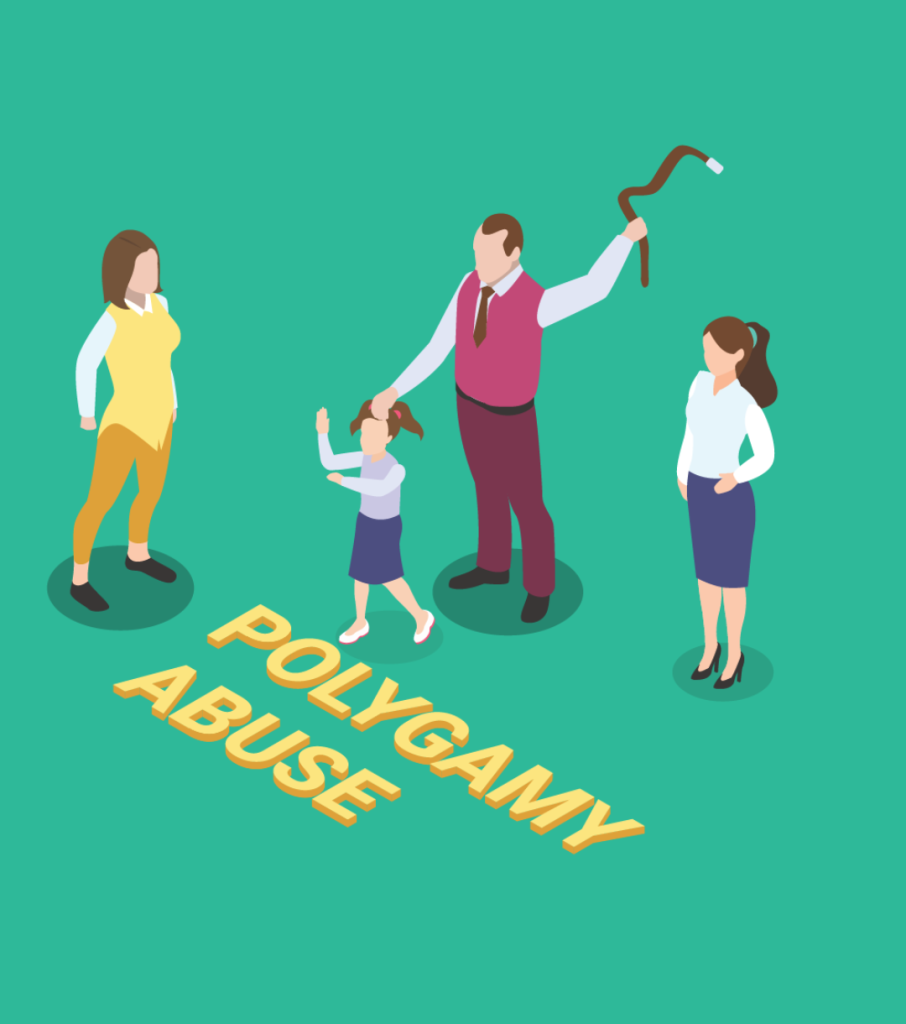Stand Together Network Domestic Violence
Our Blogs
Polygamy
What is polygamy?
Polygamy refers to the practice of marrying multiple spouses. When a man is married to more than one wife at the same time, it is called polygyny, and when a woman is married to more than one husband at the same time, it is called polyandry. If a marriage includes multiple husbands and wives, it can be called group or conjoint marriage.
The practice of polygamy is found in many cultures and religions across the world, though it is becoming less common. In some societies, polygamy is accepted and legal, often justified by cultural or religious traditions. In contrast, many countries, particularly Western nations, have laws that prohibit polygamy.
The discussions around polygamy are often complex, involving debates on human rights, gender equality, cultural traditions, and legal standards. While some argue in favor of the practice based on cultural and religious freedom, others oppose it on the grounds of women’s rights and social welfare concerns.

Implications of polygamy
Polygamy can be a contentious topic with various social, legal, and ethical implications. It is often debated in the context of women’s rights for several reasons:
- Equality and Consent: Polygamy can undermine the principle of equality within marriage. If the practice is not based on the full and free consent of all parties, it can be exploitative and oppressive. Women in polygamous relationships may have less negotiating power, both within their marriages and in society.
- Legal and Financial Rights: In many legal systems, polygamy is illegal or unrecognized, which can leave women in such marriages without legal protection. This can affect their financial security, inheritance rights, and access to divorce and child custody.
- Health and Well-being: Polygamous marriages may pose health risks, such as the transmission of sexually transmitted infections, and can have psychological impacts due to issues like jealousy and competition among co-wives.
- Cultural and Religious Context: In some cultural and religious contexts, polygamy is accepted and practiced openly. The discussion around women’s rights within these contexts can be particularly complex, as it involves respecting cultural traditions while also advocating for the rights and well-being of all individuals.
- Children’s Rights: The practice of polygamy can also affect the rights and welfare of children born within these relationships, impacting their legal status, inheritance rights, and emotional development.
- Societal Impact: Polygamy can perpetuate gender stereotypes and contribute to a societal structure where women are valued less than men. This can have widespread implications for women’s rights, including in areas such as education, employment, and political representation.
The debate on polygamy and women’s rights is multifaceted and varies greatly across different societies and legal frameworks. It raises important questions about how to balance cultural and religious freedoms with the need to protect the rights and dignity of all individuals, particularly women.
Types of Polygamy:
- Polygyny: This is the most common form of polygamy, where a man has more than one wife at the same time. Polygyny has been practiced in various cultures and is often associated with societies that have a high value on progeny and expanding family lines.
- Polyandry: This is a less common form and involves a woman having more than one husband at the same time. Polyandry is much rarer than polygyny and is often practiced in societies where resources are scarce, as it can limit the number of children and ensure that there is adequate provision for them.
- Group marriage: Also known as a conjoint marriage, this is when the family unit consists of multiple husbands and multiple wives. This form of polygamy is the least common and often involves complex marital arrangements where all members are considered married to each other.
- Legal Status: Polygamy is illegal in most Western countries and many others around the world. However, it is legal or tolerated in various countries, mainly in Africa, the Middle East, and parts of Asia, often within certain religious and cultural communities.
- Religious Context: Polygamy is practiced in some religious contexts. For example, certain sects of Islam allow a man to have up to four wives, provided he can treat them all equally. Some fundamentalist Mormon groups also practice polygamy, though it is officially prohibited by the mainstream Church of Jesus Christ of Latter-day Saints.
- Cultural Practices: In some cultures, polygamy is tied to social status, where wealthier men have more wives. It is also sometimes practiced for economic reasons, as multiple spouses can contribute to the family’s resources.
- Women’s Rights: There are concerns about polygamy’s impact on women’s rights, as it can lead to imbalances in power dynamics within marriages, affect women’s economic status, and has been linked to adverse outcomes in health and education for women and children.
- Legal Complications: Polygamous marriages can lead to complex legal situations, especially in countries where the practice is illegal. Issues can arise concerning inheritance, taxation, immigration, and recognition of marriage status.
- Population Dynamics: Some sociologists argue that polygamy can influence population dynamics, particularly in societies where polygyny is practiced, potentially leading to an excess of unmarried men in the population.
- Historical Context: Historically, polygamy was practiced in many cultures around the world. It was often linked to the need for labor, alliances between families, and the care of women in societies with high male mortality rates.
Each type of polygamy has its own social, economic, and sometimes religious justifications and is subject to a wide range of legal statuses around the world. Understanding polygamy requires considering these various aspects, and the practice continues to be a topic of significant debate, especially in relation to human rights and gender equality.

Helping people stuck in polygamous relationships
Helping individuals who face challenges associated with polygamy involves a multifaceted approach, considering legal assistance, social support, education, and advocacy. Here are several ways to provide help:
- Legal Support: Offer access to legal advice and representation. Individuals in polygamous relationships may need help understanding their rights, especially in regions where polygamy is illegal or unrecognized by the state. Legal support can also assist with issues like divorce, child custody, and inheritance.
- Counseling Services: Provide psychological support. Counseling can help individuals navigate the emotional and psychological complexities of polygamous relationships, such as issues of self-esteem, rivalry, and stress.
- Education: Increase awareness and educational opportunities, particularly for women and children in polygamous communities. Education empowers individuals to make informed decisions about their lives and can provide pathways to economic independence.
- Economic Empowerment: Support economic independence through job training, financial literacy programs, and microfinance opportunities. Economic empowerment is crucial for those who may want to leave polygamous arrangements but are financially dependent.
- Social Support Networks: Create or facilitate access to support groups. Connecting with others in similar situations can provide emotional support, share resources, and reduce feelings of isolation.
- Healthcare Access: Ensure that individuals have access to health services, including sexual and reproductive health care. Education on health rights and access to medical services is vital.
- Advocacy and Policy Change: Work with policymakers to advocate for the rights of those in polygamous relationships. This might involve pushing for legal reforms to ensure that all marriage practices respect the rights of individuals.
- Crisis Intervention: Offer immediate assistance in cases of abuse or coercion, including safe houses and emergency services. Some individuals in polygamous arrangements may be experiencing domestic violence or abuse.
- Community Education: Engage in community dialogue and education to address the cultural and religious practices that support polygamy. Sensitivity to local customs and beliefs is important in these efforts.
- Youth Programs: Develop programs for young people to learn about their rights, healthy relationships, and consent. Empowering the younger generation can contribute to long-term societal change.
- Research and Awareness: Support and conduct research to better understand the impact of polygamy on individuals and societies. Use this research to raise awareness and inform policy.
Those providing assistance should be culturally sensitive and respectful of individuals’ choices and beliefs while prioritizing safety, informed consent, and human rights. Collaboration with local organizations and stakeholders is often key to effectively supporting individuals affected by polygamy.
The legality of polygamy in the UK
Polygamy is not legally recognized in the United Kingdom, and engaging in polygamous marriage is a criminal offense. According to UK law, specifically the Matrimonial Causes Act of 1973, it is illegal for someone to be married to more than one person at the same time, whether that is polygyny (more than one wife) or polyandry (more than one husband). This stance is maintained across England and Wales, where the crime associated with polygamy is known as bigamy. Bigamy occurs when an individual who is already married goes through a marriage ceremony or enters into a civil partnership with another person. Conviction for this offense can result in imprisonment for up to seven years.
Furthermore, even if a polygamous marriage ceremony is conducted abroad, it will not be legally recognized in the UK if the involved parties are domiciled or living in England and Wales at the time of marriage. Such a marriage would be considered void within the UK jurisdiction, regardless of where the ceremony was performed.
The legal perspective on polygamy in the UK is influenced by a historical context that includes religious and colonial legacies. Criticisms have been raised against the current legal framework, with claims that it contains racist, sexist, imperialist, and orientalist underpinnings, primarily aimed at preserving the institution of monogamy in England.
The prohibition of polygamy in the UK reflects broader global trends where polygamy is generally not recognized or is illegal in many countries, especially in the West. However, it is a complex and nuanced issue, with debates surrounding the intersection of law, personal freedoms, cultural practices, and human rights.
The impact of polygamy on families
The impact of polygamy on individuals, families, and societies can be extensive and varies greatly depending on cultural, religious, legal, and socio-economic contexts. Here are several potential impacts of polygamy:
- Family Dynamics: Polygamy can affect family structures and dynamics, potentially creating complex hierarchies and networks of relationships within a household. This can influence the distribution of resources, emotional bonds, and familial roles.
- Children’s Welfare: The effect on children raised in polygamous families can be significant. There may be issues related to inheritance, identity, emotional support, and parental attention. Studies have shown mixed outcomes for children in polygamous families, with some experiencing negative effects on their social, emotional, and educational development.
- Women’s Rights: Polygamy is often critiqued from a women’s rights perspective. Critics argue that it can lead to diminished rights for women, reinforcing patriarchal structures and sometimes resulting in economic and emotional disadvantages for some wives.
- Economic Impact: Polygamous households may face unique economic challenges. The need to support multiple spouses and potentially many children can lead to financial strain. Conversely, in some contexts, polygamous families can pool resources for greater economic stability.
- Legal Challenges: In countries where polygamy is illegal, those in polygamous relationships may face legal repercussions. Moreover, the legality can affect immigration, taxation, inheritance, and custody issues.
- Health Concerns: Public health officials have raised concerns about the spread of sexually transmitted infections (STIs) in polygamous communities, especially where there is an overlap with practices of child marriage or forced marriage.
- Social and Cultural Impact: Polygamy can reinforce certain cultural or religious traditions, and it may be a significant aspect of identity for some communities. However, it can also lead to social tensions, particularly in regions where the practice is legally and socially disapproved.
- Psychological Impact: The psychological wellbeing of individuals in polygamous marriages can be affected by factors such as jealousy, competition, and societal stigma.
The impact of polygamy is complex and can’t be generalized, as outcomes can vary widely. It is important to consider the consent, autonomy, and wellbeing of all individuals involved when discussing the impacts of polygamy.
